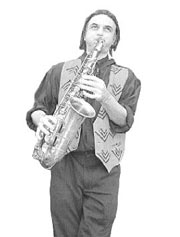AVRAM FEFER
Polestar Music Gallery, 329-4224 $8, 8 p.m. Sun., Aug. 18
New Orleans Restaurant, 622-2563 $5, 7:30 p.m. Mon., Aug. 19
Brad’s Swingside Cafe, 633-4057 $10, 8 p.m. Thurs., Aug. 22
My brother is playing in town. You should check him out. I recommend him. He’s my pick of the week.
Of course, this is an abuse of my position as the Seattle Weekly‘s sometime jazz critic. But what isn’t? As I’ve mulled over the inappropriateness of previewing my own brother, I’ve been thinking about the factors that influence all I cover in this paper—what shows to highlight, whom to feature, and, above all, whom to ignore (since that’s what I and every jazz writer in this town do the most of)—and I see a lot of bias, whimsy, and convenience in those choices. Some of it is simply the critic’s prerogative, some just the shortcuts taken out of necessity. But the factors leading me to write about my brother now are no less clean and “objective” than the factors affecting my choices every other week; in the best world, I just make space for what hits me.
So on the one hand, writing about my own brother is the worst violation of music journalism ethics imaginable. And then on the other hand, I know that if I just happened to hear the tenor solo on “Chazz,” the second track on my brother’s CD, Few and Far Between (Boxholder), I would be thinking, “Who is that motherfucker?”
My big brother’s been in New York, gigging in and around the Lower East Side since 1995, and the five years before that he spent in Paris. He can play in unrestrained free settings with only a drummer, tear up standards in the Joe Henderson/ Sonny Rollins sax trio mode, hold down a chair in large modern enterprises like the Mingus Big Band or the Butch Morris Orchestra, lead ambient/ funk or Moroccan jams. He’s done all those things and will offer similar variety during three different gigs here (avant trio at Polestar, more trad trio at New Orleans, open duo with bassist Michael Bisio at Brad’s).
Most people, of course, would assume that I am critically biased toward him. But my brother would say—has said—that it’s the opposite, really: that, as his brother, I have a harder time appreciating his achievements, recognizing him as an equal member of that company of N.Y.C. jazz musicians whom I write about regularly in the Weekly. Because, of course, he is my brother and I can remember when he was squeaking on a clarinet through the bedroom walls. Back then it was beyond imagining he’d ever be someone whose CD (the one I mentioned earlier) would get a four-star review in Down Beat. I talk to him all the time; I can’t interview him. And in our family, we’re just plain hard on each other. So it may really be that my brother has a higher bar to meet than most, as far as this jazz writer goes.
But then I can hear stuff that few others do; I hear the ’70s CTI soul that grounds his wilder free jazz side, because I was there, on the drums, playing along with Stanley Turrentine and Grover Washington Jr. records in our Bellevue living room, and that thread is still obvious to me today. Sometimes I feel like I can hear the thinking behind his playing, like the film geek who is conscious of all the cuts and angles.
There’s a stream of avant-gardism, one especially celebrated in Seattle, in which the players like to imagine music as something invented on the day they started making noise. As much as they avoid any connection to musical history, subvert and avoid traditional strains of ideas and forms—that’s the degree to which they feel they’re doing something worthwhile. My brother isn’t one of those people. He’s part of a different school, the school in which you go to school and recognize jazz history as a legacy that you respect as well as build on. Av is no transcriber, though; he’s the farthest thing from a Wyntonite. But he is someone who has a deep love of the jazz tradition—its breathy romance, its exhilarating freedom of swing, its black rope of shrieks and squeals.
To my brother, the mark of real art is that it costs something of the person who created it—not money, obviously, but a real piece of themselves. That’s something people hear in Avram’s playing and something that I think sets him apart from a lot of more celebrated musicians—Dave Douglas and Ben Allison come to mind; they’re working it, no doubt, but it never quite seems to be costing them anything.
In my own case, art cost me quite a lot, in a nonmetaphorical sense, since hearing damage forced me to give up the drums. And that’s the truly selfish reason for writing about my brother: so I can keep playing along.









